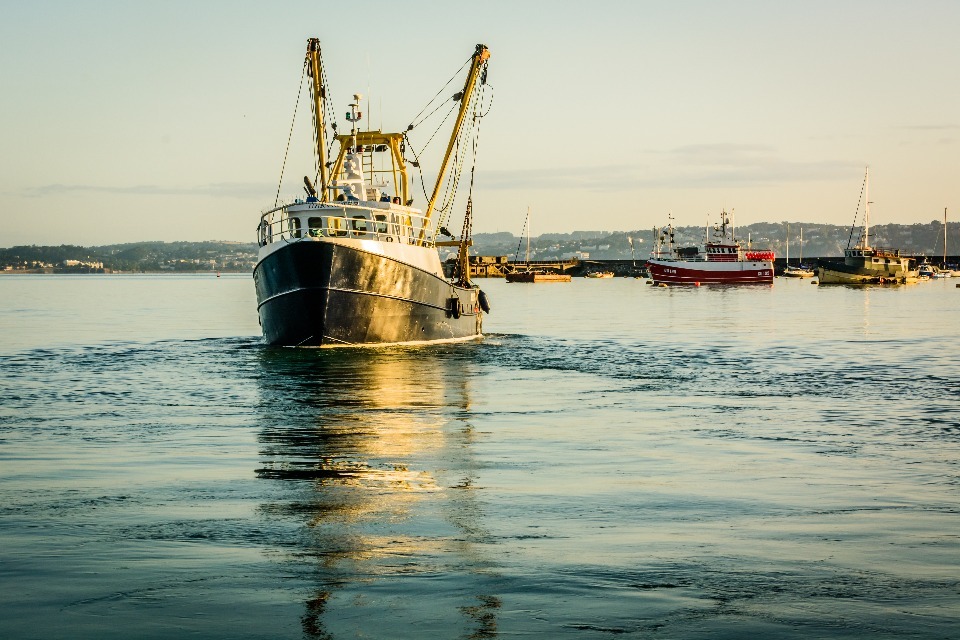UK fishers demonstrating how they will deliver environmental, social, and economic benefits will be awarded with additional quota this week.
Following last year’s successful pilot, the 2025 Quota Application Mechanism trial has been expanded to include English non-sectoral over-10-metre vessels alongside producer organisations with English members.
Around 8,658.8 tonnes of quota will be awarded to applicants who scored highest against the environmental, social, and economic criteria based on how they will use the additional allocation.
Measures to be rewarded include
- investments in improved fishing gear, reducing environmental impacts while enhancing selectivity to minimize unwanted catches;
- acoustic deterrents to help protect vulnerable marine wildlife by preventing accidental entanglement in fishing gear;
- employment of local crew, strengthening coastal communities by providing sustainable livelihoods and preserving traditional fishing heritage;
- vessel upgrades focused on crew safety and welfare to ensure that fishing remains a viable career with improved working conditions.
Amongst other stocks, 535 tonnes of North Sea Cod, 1162 tonnes of North Sea Saithe, and 213 tonnes of Western Skates and Rays will be awarded to sectoral and non-sector fishers.
Fisheries Minister Daniel Zeichner said
I’m delighted to see the expanded Quota Application Mechanism rewarding fishers who demonstrate clear commitments to sustainability.
By allocating quota based on environmental, social, and economic criteria, we’re charting a new course for UK fisheries that balances conservation with economic prosperity. It’s a vital step towards building a sustainable and profitable fishing industry, as part of our Plan for Change.
Dale Rodmell, Chief Executive of Eastern England Fish Producers Organisation Ltd. said
We appreciate the efforts made by the government to make a new approach to quota allocation work.
It recognises the efforts we are making to realise environmental, social and economic benefits from under-utilised and additional quota resulting from the Trade and Cooperation Agreement.
Paul Stone, Director of Stone Marine Services (South West) Ltd, said
It’s really something to help diversify and enables us to free up more options and rest areas which are tight for quota, helping us to fish sustainably. It’s been life-changing to the company; it makes life easier for the crew and the fish quality is better.
It’s nice to be recognised. As a small private company, it means a heck of a lot.
Shaun Hayter, Director of Bubba Shrimp Ltd, said
Being awarded this quota will make a massive difference. It will keep us fishing all year and the crew busy. It gives other grounds a rest and makes everything financially viable.
I’ve been really looking forward to this year and so has the crew. It’s a massive opportunity and seems like a step in the right direction.
The quota has been drawn from England’s additional quota allocation and anticipated underutilised non-sectoral quota.
This trial represents a significant shift from standard quota allocation methods, introducing a criteria-based approach that aims to enhance sustainable fisheries management by considering broader environmental outcomes alongside the social and economic interests of fishing communities.
Lessons from this trial will shape how fishing quotas are allocated in the future, helping protect fish stocks and support fishing communities for the long-term.
Further information
The breakdown of tonnages to be awarded as a part of the 2025 Quota Application Mechanism is as follows
- 535.2 tonnes of North Sea Cod (165.5T of this is to the non-sector)
- 1166.7 tonnes of North Sea Saithe (24.7T of this is to the non-sector)
- 2830 tonnes of North Sea Herring (20T of this is to the non-sector)
- 212.9 tonnes of Western Skates and Rays (75T of this is to the non-sector)
- 3914 tonnes of Western Mackerel (4T of this is to the non-sector)
- This is subject to the applicants accepting the Quota.
Eastern England Fish Producers Organisation was awarded
- 369.7T of Cod North Sea
- 1141.7T of Saithe North Sea
- 155T of Herring North Sea
- 137.9T of Skates & Rays Western
- 1340T of Mackerel Western
Humberside Fish Producers’ Organisation was awarded
- 2655T of Herring North Sea
- 2570T of Mackerel Western
As part of the conditions for receiving the quota, applicants have committed to delivering a range of benefits including
Environmental performance
- Advanced monitoring technologies like remote electronic monitoring provide real-time data on fishing activities, supporting sustainable management of marine resources.
- Investments in improved fishing gear, reducing environmental impacts while enhancing selectivity to minimize unwanted catches.
- Participation in scientific studies to contribute vital information that strengthens our understanding of marine ecosystems and stock health.
- Fuel-saving techniques to not only reduce operational costs but also lower carbon emissions.
- Acoustic deterrents to help protect vulnerable marine wildlife by preventing accidental entanglement in fishing gear.
Social contribution
- Employment of local crew, strengthening coastal communities by providing sustainable livelihoods and preserving traditional fishing heritage.
- Vessel upgrades focused on crew safety and welfare ensure that fishing remains a viable career with improved working conditions.
- Engagement with local apprenticeship schemes to create pathways for young people to enter the industry, securing its future.
- Participation in careers fairs to raise awareness about opportunities in the fishing sector, attracting diverse talent to the industry.
Economic benefits
- Landings into UK ports stimulate local economies through direct employment and supporting additional dockside businesses.
- Supply to local and domestic processors strengthens our food security while adding value to catches within the UK economy.
- Use of local business services creates multiplier effects, where fishing activity supports a broader network of maritime and coastal enterprises.

